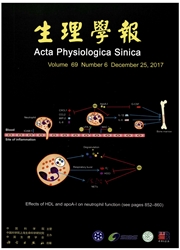

 中文摘要:
中文摘要:
本文旨在建立一种能在平原地区有效、稳定模拟高原低氧炎症导致脑损伤的小鼠模型。选用8周龄雄性C57BL/6小鼠为建模对象,利用低压低氧舱模拟海拔6 000 m处的高原低氧条件,采用腹腔注射5 mg/kg脂多糖(lipopolysaccharide,LPS)诱导炎症反应,作用时间为12 h。通过ELISA检测小鼠血清中促炎因子IL-6、TNF-α及抑炎因子IL-10的水平,探讨模拟高原低氧炎症的有效性;并通过组织切片HE染色评价高原低氧炎症诱发的脑损伤组织形态变化。结果显示,模拟海拔6 000 m高原低氧环境联合LPS处理组的炎症反应最为剧烈,小鼠血清中IL-6、TNF-α、IL-10表达显著高于对照组(P〈0.001,P〈0.000 1,P〈0.000 1)、高于单纯高原低氧处理组(P〈0.000 1,P〈0.000 1,P〈0.001),也高于单纯LPS处理组(P〈0.05,P〈0.000 1,P〈0.000 1)。同时,与单纯高原低氧环境组或LPS处理组相比,高原低氧环境联合LPS处理组显示出更为严重的脑组织损伤,皮层、海马部位出现细胞肿胀、细胞间隙增宽、血管增生及神经元皱缩伴随核固缩深染等现象更为明显。引人注意的是,丘脑腹后核群区对高原低氧联合LPS处理更为敏感,组织结构的破坏程度更甚于皮层和海马部位,且伴有细胞排列紊乱现象。以上结果提示,本研究利用低压低氧舱模拟高原低氧环境并联合LPS处理,在平原地区成功建立了一种与高原低氧炎症导致脑损伤高度相似的小鼠模型,有望应用在后续相关研究中。
 英文摘要:
英文摘要:
The aim of this study was to develop a murine model of brain injury induced by high altitude hypoxic inflammation. In the study, we used a decompression chamber to mimic an acute hypobaric hypoxia, and 8-week-old male C57BL/6 mice were intraperitoneally injected with 5 mg/kg lipopolysaccharide(LPS) to induce inflammatory response. We determined the levels of pro-inflammatory factors(IL-6, TNF-α) and anti-inflammatory factor(IL-10) in mice serum using ELISA assays to confirm the high altitude hypoxic inflammation, and verified the brain injury after the inflammation using hematoxylin-eosin(HE) staining. The results showed that, among four experiment groups(ctrl, acute hypobaric hypoxia, LPS, and acute hypobaric hypoxia plus LPS groups), the acute hypobaric hypoxia plus LPS treatment group displayed the highest levels of IL-6, TNF-α, and IL-10. Meanwhile, the acute hypobaric hypoxia plus LPS treatment group showed the most severe cortex and hippocampus injuries, including cellular swelling, the widened pericellular spaces, angiogenesis, and shrunken neurons with darkly stained pyknotic nuclei, etc. Strikingly, nuclei ventrales posteriors thalami were found to be more sensitive to acute hypobaric hypoxia plus LPS treatment, and their destroy degrees were higher than those neurons in cortex and hippocampus. These results suggested that we established a reliable murine model of brain injury induced by high altitude hypoxic inflammation, and might be useful to the relevant studies.
 同期刊论文项目
同期刊论文项目
 同项目期刊论文
同项目期刊论文
 期刊信息
期刊信息
